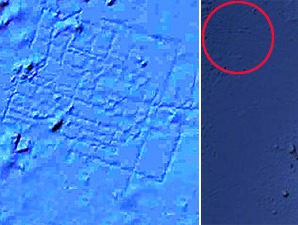Atlantis still a lost city, says Google
Despite what The Sun says about Bernie Bamford's discovery

Sign up for breaking news, reviews, opinion, top tech deals, and more.
You are now subscribed
Your newsletter sign-up was successful
Google has denied that the fabled lost city of Atlantis has been 'discovered' via the recently released Ocean in Google Earth.
A number of UK tabloids got slightly ahead of themselves earlier today, claiming that a rectangular grid around the size of Wales 620 miles off the west coast Africa on Madeira Abyssal Plane was indeed the lost city of Atlantis.
The grid was spotted by Bernie Bamford from Chester while taking a virtual dip in Google Earth.
And while The Sun was quick to jump on the fact that Bamford claimed he had found a "man-made aerial map" of an underwater city and a number of other media outlets quoted curator of historical archaeology at New York State University saying that "the site is one of the most prominent places for the proposed location of Atlantis," Google has quickly denied the possibility.
Google does the PR switch
Quick to capitalise on this unexpected publicity, Google's Laura Scott told TechRadar:
"It's true that many amazing discoveries have been made in Google Earth - a pristine forest in Mozambique that is home to previously unknown species, a fringing coral reef off the coast of Australia, and the remains of an Ancient Roman villa, to name just a few.
Sign up for breaking news, reviews, opinion, top tech deals, and more.
"In this case, however, what users are seeing is an artefact of the data collection process. Bathymetric (or seafloor terrain) data is often collected from boats using sonar to take measurements of the seafloor. The lines reflect the path of the boat as it gathers the data. The fact that there are blank spots between each of these lines is a sign of how little we really know about the world's oceans."
So. To quickly recap. A man with a funny name in Chester didn't find Atlantis on the internet. But Ocean in Google Earth still rocks.
